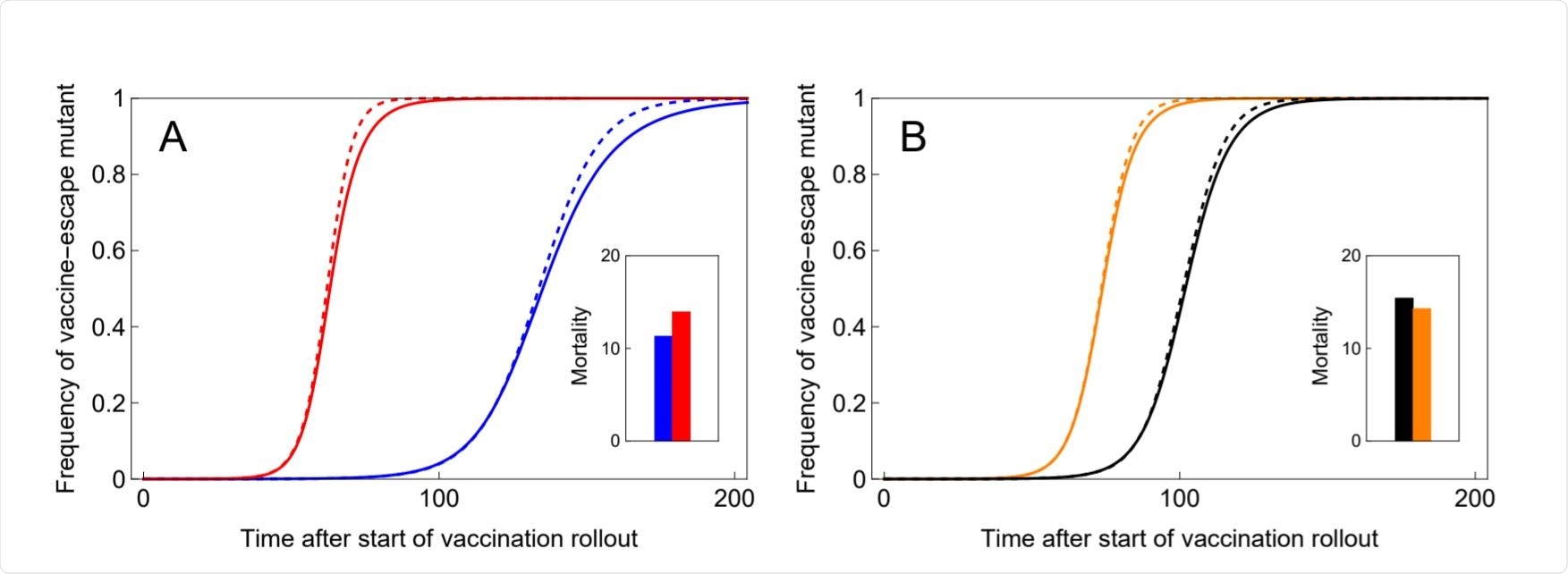The widespread rollout of vaccination campaigns throughout the world has severely slowed the spread of SARS-CoV-2 in those places where they are available, though limited supply is still a burden that must be mitigated, particularly in poorer nations.
Various vaccination distribution strategies have been proposed, and many studies have demonstrated that there is a trade-off between vaccinating the most vulnerable first, and achieving the highest survival rate, or vaccinating those most likely to transmit, and achieving the greatest suppression of the virus.
In a paper recently uploaded to the preprint server medRxiv* by Gandon & Lion (June 8th, 2021) the impact of a number of vaccination strategies is assessed instead with regards to the probability of inducing a SARS-CoV-2 vaccine escape mutants, which could play an increasingly important role in future COVID-19 management.

Vaccination Results. Image Credit: https://www.medrxiv.org/content/10.1101/2021.06.09.21258644v1.full.pdf

 This news article was a review of a preliminary scientific report that had not undergone peer-review at the time of publication. Since its initial publication, the scientific report has now been peer reviewed and accepted for publication in a Scientific Journal. Links to the preliminary and peer-reviewed reports are available in the Sources section at the bottom of this article. View Sources
This news article was a review of a preliminary scientific report that had not undergone peer-review at the time of publication. Since its initial publication, the scientific report has now been peer reviewed and accepted for publication in a Scientific Journal. Links to the preliminary and peer-reviewed reports are available in the Sources section at the bottom of this article. View Sources
Vaccinating against transmission
The authors developed a selection coefficient, a quantitative description of the relative fitness of a group, applied to the probability of vaccine escape mutants developing. This value took into account host quality, representing a vaccinated or non-vaccinated individual, and allowed them to track the frequency of escape mutants developing.
Two host types were firstly constructed: those with low or high levels of social interaction, representing the least and most transmissive individuals in a population. Additionally, a value was applied to the chance of an escape mutant evading vaccine-induced immunity, from 0 to 1, and an escape mutant developing in a vaccinated host.
According to the formula developed by the group, a higher rate of contact between individuals ultimately results in more intensive selection among SARS-CoV-2 mutants, as does being vaccinated, translating into a higher probability of escape mutants developing. Therefore, targeting high contact individuals first in a vaccination campaign reduced the chance of escape mutants developing most strongly, though targeting low contact individuals, who are most likely to also be vulnerable, reduces mortality most greatly.
Vaccinating more widely
The vaccination strategy of distributing one dose per individual more widely, rather than providing two doses to half as many individuals, was also investigated by the group by introducing a “partially vaccinated” category. This strategy causes less intense selection pressure in the fully vaccinated, as there are fewer of them, though a larger number of individuals being partially vaccinated may promote the effect of escape mutants developing even more strongly.
The group found that the latter effect was stronger and that the frequency of escape mutants increased under a single dose vaccination strategy, though in this case this strategy also caused mortality to decrease, as a larger proportion of the population was at least partially protected and benefitted from the lesser symptoms of COVID-19 incurred when vaccinated.
Future vaccination strategies
The group state that these findings require far more robust investigation before they are applied as any specific recommendations to ongoing vaccination campaigns, though it seems probable from these findings that both differences in behavior (high or low contact) and vaccination status (fully, partially, or non-vaccinated), can have a profound impact on the development of escape mutants that could severely cut short the useful lifetime of a vaccine, should one develop.
Other studies that have examined inter-host selection pressure towards SARS-CoV-2 have concluded, in contrast to the above, that vaccinating the most vulnerable first actually increases escape mutant frequency. However, this study focused on intra-host selection pressure, intended to better reflect selection for escape mutants in vaccinated individuals, and the authors state that combining inter-and intra-host selection factors remains to be explored.
The longevity of any available vaccine may be at stake if escape mutant frequency is not taken into account in future vaccination campaigns, potentially resulting in an ongoing fight with COVID-19 that requires constant vaccine updates.

 This news article was a review of a preliminary scientific report that had not undergone peer-review at the time of publication. Since its initial publication, the scientific report has now been peer reviewed and accepted for publication in a Scientific Journal. Links to the preliminary and peer-reviewed reports are available in the Sources section at the bottom of this article. View Sources
This news article was a review of a preliminary scientific report that had not undergone peer-review at the time of publication. Since its initial publication, the scientific report has now been peer reviewed and accepted for publication in a Scientific Journal. Links to the preliminary and peer-reviewed reports are available in the Sources section at the bottom of this article. View Sources